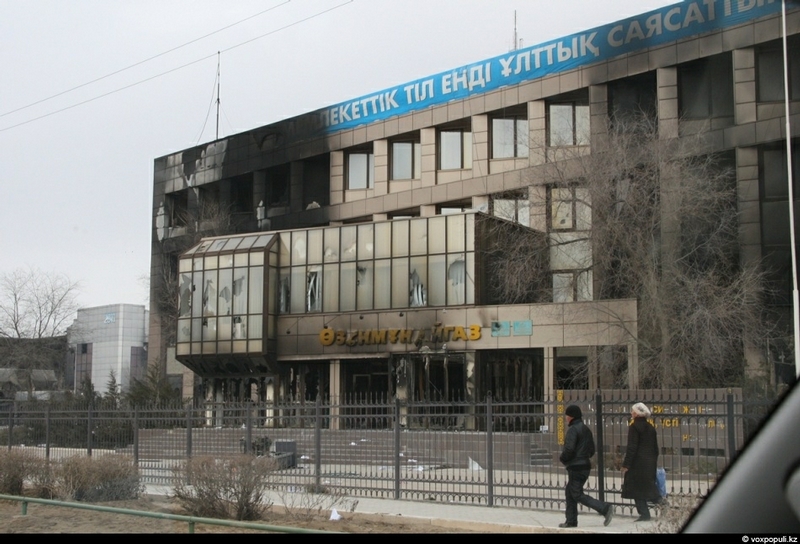
Western Investors Ponder Kazakhstani Market After Zhanaozen
Publication: Eurasia Daily Monitor Volume: 9 Issue: 21
By:

One reason why Kazakhstan, despite its small population and remote location from the world’s major economic and political centers of influence, has been able to exercise considerable influence in global affairs is that it attracts enormous foreign investment. Along with its oil wealth, foreign investors welcome the new country’s record of political stability, internal security, and docile labor market. But the December 16 violence in Zhanaozen has rattled some foreign investors, adding to longer standing commercial concerns as well as worries about the uncertain political succession process as Kazakhstan transitions to a new, post-Soviet generation of leaders.
International rankings still rate the business climate in resource-rich Kazakhstan relatively highly compared to other major energy producers (Doing Business Report for 2012, World Competitiveness Yearbook – 2011), but more incidents like Zhanaozen could lead some Western investors to curtail their investments in Kazakhstan.
Thus far, the incident has not dented Kazakhstan’s magnetic pull on foreign investors. During its first two decades of independence since December 1991, Kazakhstan received more than $130 billion of foreign direct investment (Kazakhstan News Bulletin, January 27).
Although there have been some terrorist bombings in the past year, they have been isolated and resulted in few casualties (Trend, December 29, 2011). Labor unions eschew violence even in their rare strike actions. Workers have generally seen rising living standards in line with Kazakhstan’s overall prosperity. Despite recurring allegations of election fraud (OSCE, https://www.osce.org/odihr/86985; State Department, January 16, 2012, https://www.state.gov/r/pa/prs/ps/2012/01/180810.htm), the government of President Nursulatan Nazarabayev seems popular.
Still, like others living and working in Kazakhstan, Western investors expressed unease about their lack of information regarding what really happened at Zhanaozen. For now, Western investors are more concerned with traditional issues such as corruption, taxes, local content regulations, and bargaining over contract provisions. Jamestown had an opportunity to interview senior executives of several Western and Kazakhstani companies in Aktau, a two hours’ drive from Zhanaozen, before and after monitoring the parliamentary elections in Zhanaozen on January 15.
The Western investors agree with other sources that corruption has declined over the years, but still remains a problem. They often need approval to import highly specialized drilling and other equipment due to the complex geophysical conditions at Kazakhstan’s offshore hydrocarbon projects. Paying bribes to key people is often essential for securing their entry.
The Kazakhstani authorities recently announced the detention of several current and former senior government officials of Zhanaozen as well as executives of the local affiliate of the state oil and gas company KazMunaiGaz (KMG), on suspicion that they diverted funds that should have gone to improving social conditions of the workers and other residents of the town (Interfax-Kazakhstan news agency, January 25). Nazarbayev stressed the importance of fighting corruption in his January 27, 2012 State of Nation Address (www.kazakhstanlive.com).
Another Western business concern is that government’s policy of restricting the number of foreign nationals that companies can import to run their operations. Although the skills of Kazakhstani managers and technical workers continues to increase thanks to government education programs as well as business initiatives, Kazakhstan still lacks senior managers with long experience running large projects as well as highly trained experts in some special technical issues required to manage the challenges at their complex offshore hydrocarbon projects.
That KMG, backed by the Kazakhstani government, has been trying to force Western companies to give it shares in their projects despite the absence of such a condition in their original investment contracts irritates Western investors. When the government and KMG try to force changes in their Production Sharing Agreements at a time when the investments are about to produce something, they undermine the original calculations.
Western investors also complain that the continuing changes in Kazakhstan’s tax code also complicate their calculations. In addition, they find the requirement to keep lengthy tax and personnel records in a special government archives burdensome.
Although Western investors agree that local business conditions have improved, they raised additional complaints about the new uncertainties introduced by the new Russia-Belarus-Kazakhstan Customs union that entered into force at the beginning of this year. A future fear is that the Kazakhstani authorities will follow the Russian playbook and seek to use environmental and other regulations to force Western companies to transfer projects that finally begin to yield a profit to Kazakh control.
Nonetheless, the main Western concern about the future is that there will be more instances of labor violence such as that which occurred in Zhanaozen. The Kazakhstani authorities have taken vigorous action to avert such a development. For example, President Nazarbayev announced in his 2012 State of the Nation Address a new government initiative to diversify employment in single-industry towns like Zhanaozen.
But Western investors, like everyone else, worry whether Kazakhstan’s weak political and social institutions will manage the transition when Nazarbayev, who has centralized political power in his hands for the past two decades, leaves the scene.




